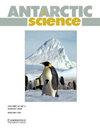Renewables in Antarctica: an assessment of progress to decarbonize the energy matrix of research facilities
IF 2
4区 地球科学
Q3 ENVIRONMENTAL SCIENCES
引用次数: 2
Abstract
Abstract This paper tracks the progress of renewable energy deployment at Antarctic facilities, introducing an interactive database and map specifically created for this purpose. Goals, challenges and lessons learnt from these operations are also reported. The data and assessments presented are based on a literature review of government reports, academic articles, online resources, news outlets and interviews conducted with personnel of Antarctic stations. As of 2021, 29 facilities have incorporated renewables in their energy systems, but only one permanent and four summer stations use renewables to meet more than 50% of their energy needs. Four main goals behind the development of renewable energy systems have been identified: fuel cost savings; reduction of the greenhouse gas emissions footprint in alignment with national decarbonization targets; electricity supply for scientific equipment during the winter months; and the development and/or testing of new technologies. The extreme weather conditions and complex logistics of Antarctica put both solar and wind systems under huge stress, which generates operational, technological and budgetary challenges that are also explored in this work.南极洲的可再生能源:对研究设施能源矩阵脱碳进展的评估
摘要本文跟踪了南极设施可再生能源部署的进展,介绍了专门为此创建的交互式数据库和地图。还报告了这些行动的目标、挑战和经验教训。所提供的数据和评估基于对政府报告、学术文章、在线资源、新闻媒体的文献综述以及对南极站工作人员的采访。截至2021年,29个设施已将可再生能源纳入其能源系统,但只有一个永久性和四个夏季发电站使用可再生能源来满足50%以上的能源需求。已经确定了发展可再生能源系统的四个主要目标:节省燃料成本;根据国家脱碳目标减少温室气体排放足迹;冬季为科学设备供电;以及开发和(或)测试新技术。南极的极端天气条件和复杂的物流使太阳能和风能系统都面临巨大压力,这带来了运营、技术和预算方面的挑战,这项工作也在探讨。
本文章由计算机程序翻译,如有差异,请以英文原文为准。
求助全文
约1分钟内获得全文
求助全文
来源期刊

Antarctic Science
地学-地球科学综合
CiteScore
3.60
自引率
6.20%
发文量
42
审稿时长
3 months
期刊介绍:
Antarctic Science provides a truly international forum for the broad spread of studies that increasingly characterise scientific research in the Antarctic. Whilst emphasising interdisciplinary work, the journal publishes papers from environmental management to biodiversity, from volcanoes to icebergs, and from oceanography to the upper atmosphere. No other journal covers such a wide range of Antarctic scientific studies. The journal attracts papers from all countries currently undertaking Antarctic research. It publishes both review and data papers with no limits on length, two-page short notes on technical developments and recent discoveries, and book reviews. These, together with an editorial discussing broader aspects of science, provide a rich and varied mixture of items to interest researchers in all areas of science. There are no page charges, or charges for colour, to authors publishing in the Journal. One issue each year is normally devoted to a specific theme or papers from a major meeting.
 求助内容:
求助内容: 应助结果提醒方式:
应助结果提醒方式:


